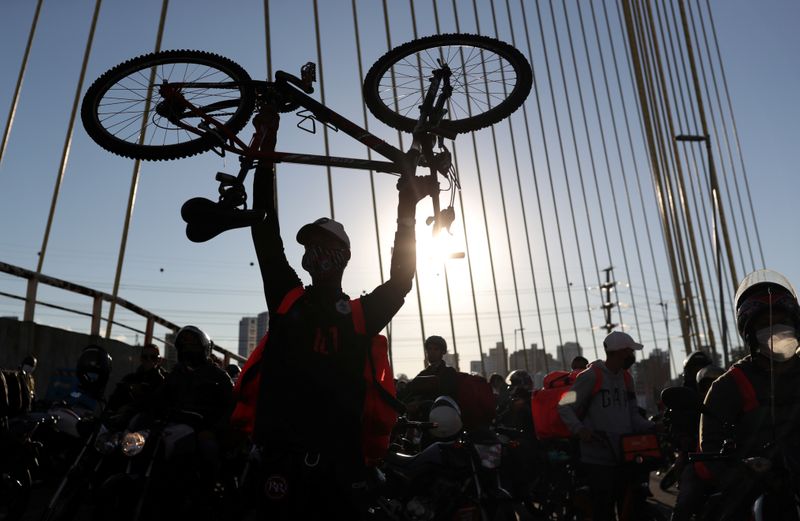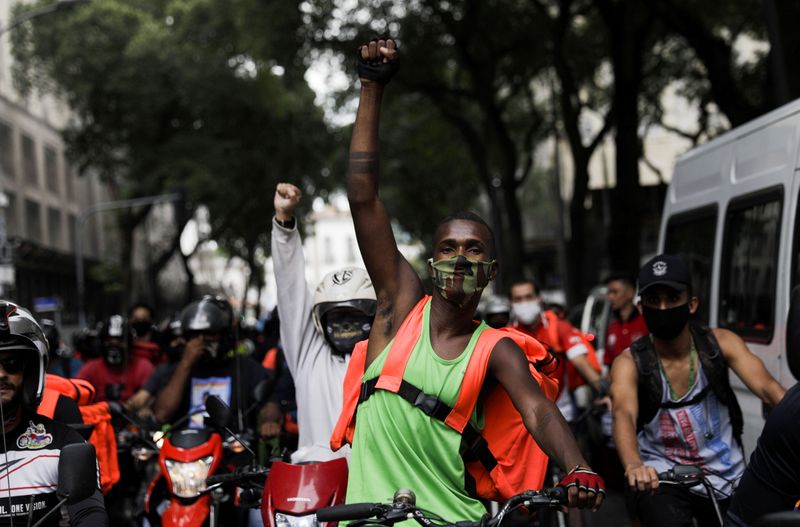By Marcelo Rochabrun and Gabriela Mello
SAO PAULO (Reuters) - Over a thousand food deliverymen on motorcycles gathered in São Paulo on Wednesday to protest their work conditions, set by Uber (N:UBER) and other apps, with their services in high demand due to coronavirus lockdowns.
The drivers seek better pay and improved health measures, with Brazil now a coronavirus epicenter and delivery workers facing exposure to the virus.
Drivers paraded through Sao Paulo's Paulista Avenue, the city's main thoroughfare, blocking traffic, and also protested in other Brazilian cities.
The government said this week that half of working-age Brazilians are out of work due to the coronavirus crisis, a record level, pushing more and more citizens into precarious employment options.
Lockdown measures have drawn more demand for delivered food. One app, iFood, said some of its users were ordering as much as 30% more deliveries now than before the crisis.
But drivers complained that the apps pay them less while making them work more, with possible suspension if they do not comply. Several said the apps lure them with high pay at the beginning, which then dwindles over time.
"They are making us work weekends, every day, or we face the risk of getting blocked," said Felipe Gomes, who delivers for iFood.
It was not the first time delivery workers have taken to the streets to demonstrate against Uber, Colombia's Rappi and Brazil's iFood. But the demonstration appeared to be the biggest.
Customers and restaurants took to social media to support the drivers, whose cause was a trending topic in Brazilian Twitter feeds.
Their working conditions have also drawn the attention of prosecutors, who have launched investigations of all the apps and sued iFood.
The companies classify drivers as freelancers, insisting the firms are intermediaries between restaurants and the delivery workforce. They say the apps provide workers with the freedom to set their hours and level of commitment. But workers and prosecutors strongly disagree.
"An algorithm determines everything for them: the value of the work, the duration of their work, even the route they should take, and if you don't accept, there are penalties," said Tatiana Simonetti, a Brazilian labor prosecutor.
Uber declined to comment, deferring to a statement by a trade group representing several apps saying it will not punish drivers who strike.
"The flexibility of apps was essential so that hundreds of thousands of people ... had an alternative to generate income and support their families," the statement said.
iFood and Rappi said worker demands have been addressed and would not commit to raising pay in response to the pressure. Rappi said most workers receive 18 reais ($3.38) per hour, although drivers told Reuters they often receive much less.
Rodrigo Gandolfo, iFood's vice-president of logistics, said deliverymen get paid around 20 reais ($3.77) per hour at the busiest times, such as lunch and dinner.
"It's hard to talk about making structural changes," Gandolfo said. "We can talk about constant improvement, but the majority of driver demands have already been covered by iFood."

The protests were to continue into the night, with the delivery workers riding their motorcycles through the city while wearing the branded backpack containers bearing the companies' logos.
